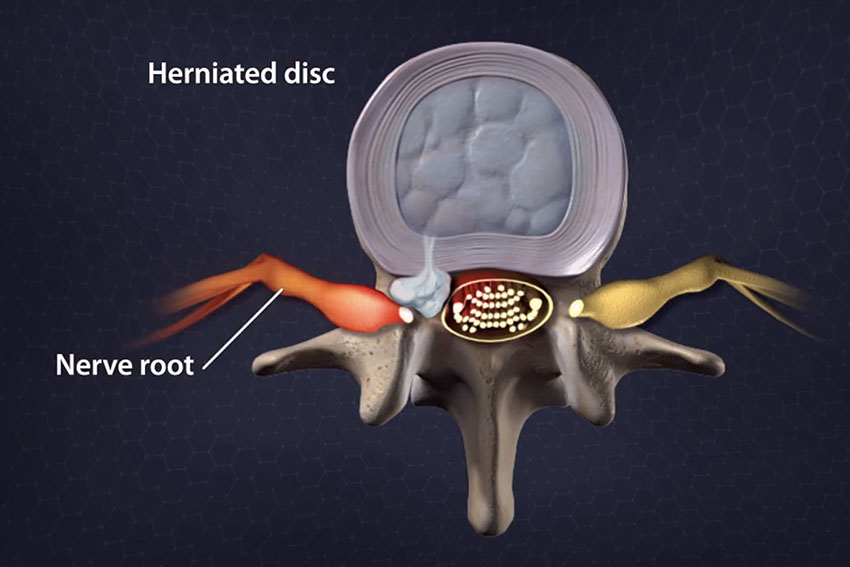
A lumbar ruptured disc, also known as a herniated disc or a slipped disc, can cause hip, lower back, leg and foot pain. The pain can develop gradually or suddenly. It can be sharp or dull, mild or severe, and it may or may not be accompanied by sciatica. Bending over, coughing, even sneezing can make the pain worse. Executive Spine Surgery in Hackettstown and Newton offers back surgery to help patients suffering from a herniated disc.
What Is Lumbar Disc Herniation?
A herniated disc occurs when a disc breaks down and starts to degenerate. As the deterioration continues, tears and rips can develop on the outer surface of the disc, allowing the inner core of the disc to leak out through the opening. The damaged part of the disc then puts pressure on the surrounding nerves. Even the slightest pressure on these nerves can bring about severe pain.
What Is Sciatica?
Sciatica is the most common symptom of a herniated lumbar disc. If the herniated disc is situated in the lumbar (or lower) region of the back, it can put direct pressure on the sciatic nerve and cause sciatica. The sciatic nerve consists of several spinal nerve branches that extend from the lower spine to the bottom of the feet. When a damaged disc is pressuring the sciatic nerve, a patient can experience weakness, numbness, tingling, burning and pain down the entire length of the leg. Leg pain can occur with or without lower back pain; but if lower back pain is present, the leg pain will almost always be worse. In rare cases, sciatica can bring about a lack of function in a leg. It can also cause a lack of function in the bladder or bowel. Symptoms of sciatica usually occur in one leg only, but sometimes both legs are affected.
How Is Lumbar Disc Herniation Treated?
At Executive Spine Surgery of Hackettstown and Newton, Dr. Spivak believes in minimally invasive treatments and back surgery for spinal conditions like a lumbar herniated disc. Ninety-percent of herniated discs can be effectively healed with treatments such as exercise, application of ice, physical therapy, spinal injections and pain medication. Dr. Spivak believes that surgery should be reserved as a treatment of last resort for those whose pain has not improved or has gotten worse after six months of noninvasive and nonsurgical treatments.
When Is Surgery The Best Treatment For Lumbar Disc Herniation?
If you think you have a herniated disc, consult with a board certified neurosurgeon like Dr. Spivak as soon as possible, preferably within six weeks after the onset of your symptoms. The sooner you start treatment, the more effective that treatment will be. During your consultation, Dr. Spivak will perform a thorough examination of your back and consult with you about the most effective noninvasive treatment options. In most cases, nonsurgical treatments will be sufficient to bring about a healing. If nonsurgical treatments don't solve the problem after six weeks, Dr. Spivak may suggest endoscopic spine surgery. This is a minimally invasive surgical procedure where tiny skin incisions are used to repair a herniated disc.
Dr. Spivak is the president of Executive Spine Surgery in Hackettstown and Newton, NJ, and a board-certified neurosurgeon for herniated disc back surgery. He is recognized worldwide for his expertise in innovative, noninvasive and state-of-the-art endoscopic spinal surgery.
